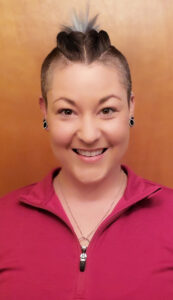Meghan Fitzpatrick, a Doctor of Nursing Practice student at the WSU College of Nursing, has been a nurse long enough to know the importance of gathering complete information from patients.
Fitzpatrick also identifies as queer nonbinary and knows from personal experience that LGBTQ patients often aren’t asked about their sexual orientation or gender identity when they see a provider or visit a clinic or hospital.
“A lot of nurses and doctors don’t feel comfortable asking patients, but getting this data and charting on patients is important,” Fitzpatrick said. Patterns in data often dictate clinical-care improvements or research advances, so it’s crucial to have such baseline information.
Fitzpatrick will tackle this issue in a DNP final project this fall. Doctor of Nursing Practice students at Washington State University are asked to investigate an area of healthcare delivery, practice or policy and propose a way to improve it.
Besides the need to get complete data, having gender and sexual orientation information at the outset will allow doctors, nurses and registration staff to respect LGBTQ patients – by using their preferred pronouns, for example.
Evidence shows that feeling respected improves health outcomes for those patient populations. “They’re more comfortable going to the doctor, going to the ER; they don’t wait until they’re super sick because they don’t feel comfortable sharing with the provider that they’re trans,” Fitzpatrick said.

Though Fitzpatrick’s project will focus only on data collection, there’s more work to be done educating healthcare providers and staff how to sensitively ask the questions. Eventually, Fitzpatrick would like to see that training become mandatory and the data collection be required throughout the healthcare system.
For now, though, “I really just want to work bettering healthcare for populations that are for the most part forgotten about or don’t have as many resources and people in their corner. Everyone deserves to have good-quality healthcare, no matter how you identify.”






